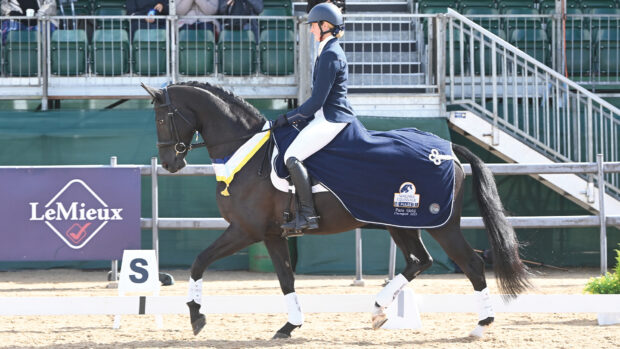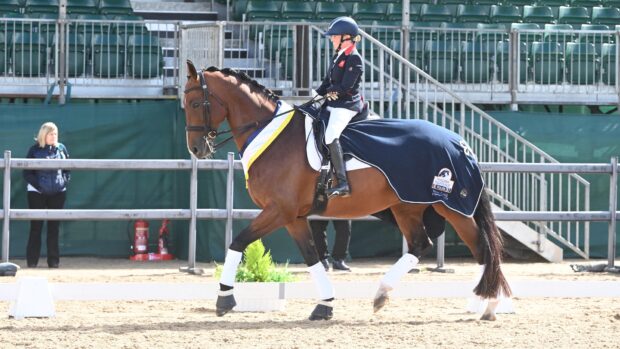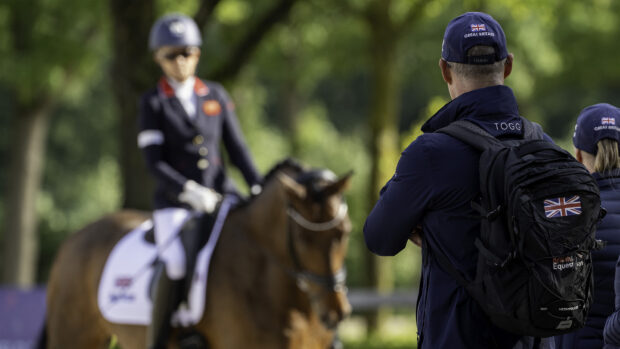Erin Orford, a world and double European medallist in grade III para dressage, on what it takes to win a championship team medal and her new role as commentator in Herning
Commentating on the live-stream at the World Para Dressage Championships was a strange but exciting experience, as I have only ever been in that sort of championship environment as a rider. I was surprised at the level of production that goes into every aspect of live-streaming and was learning on the go all week.
The area I felt most comfortable with was talking about the tests; for that it helps to be a rider, as I could sympathise with what the riders were going through and understand a bit of what they were feeling. I had to think hard about what a combination was doing, how it might come across to the judges, and it offered a really useful perspective to take into my own riding and how I could improve the way I ride and present a test.
Attracting new audiences
As a venue, Herning was great. It was big, but not as big as Tryon in 2018, for example, and here everything was quite close to the tradestands and the shopping village. That meant that at the para dressage arena, we got a lot more interest from people who hadn’t specifically come to watch para dressage. People who were just walking past popped in to watch the Danes, but stayed for other riders too, and that helps us attract new audiences and give the sport more exposure.
Denmark is strong when it comes to para dressage, and the organisers really promoted it as much as they did the other sports. It was great to see flags and banners around with para dressage riders’ faces on, as well as dressage riders and showjumpers. Sophie Wells’ face was on the first flag I saw coming into the venue!
The standard at these championships was so high, and the horsepower was insane. Denmark had two very big scorers and a third good scorer – and that wasn’t enough to win gold. The Netherlands brought their A game with a full team of very strong riders and that’s what was needed. There is no room for error now – everyone needs the ride of their life on the right day for the team to be on the podium. Last year, Britain brought home the gold because they all pulled out mega scores on the day it mattered for the team.
In Herning, Britain’s Lee Pearson and Natasha Baker both had horses a bit on their toes. They did really well to manage that and produce scores that, in the past, would have been good enough for a team medal, with Sophie’s bigger score as well. But now, teams can’t afford not to be pulling in personal best scores, or close, from all three riders. It’s great for the sport.
A confusing swap
Swapping the team and individual tests around was confusing for some of the riders watching who recognised the tests. The format itself is quite simple, but I had to try not to mention the name of the test, as it was a confusing concept that the “team test” decided the individual medals and the “individual test” decided the results for the team.
The names of the tests need to change, especially if this format is here to stay, but I’m not sure how I feel about calling them the para grand prix and grand prix special, as proposed. I worry that as we encourage new spectators into the sport, it might be confusing for them in terms of what they expect to see if it’s compared to the able-bodied dressage classes. But then again, I understand the reasoning behind the term “grand prix” referring to the peak of the sport.
It was nice to see all riders in action in both the individual and team competitions, and for those two scores to be combined to decide the top eight to progress to the freestyle. It gives riders a chance to qualify even if things haven’t gone to plan on day one, and it gives everyone at least two trips into the arena.
Previously, riders not on a team would ride just one test, and that format could be off-putting for federations with just one or two riders who may not be expecting to qualify through, as it is expensive to send riders to a championship. I very much liked that change to the format and the extra opportunity it gave all the riders, whether medal contenders or not.
• What did you think of the para dressage competition and coverage from Herning? Tell us at hhletters@futurenet.com
- This exclusive column will also be available to read in Horse & Hound magazine, on sale Thursday 26 August
You may also be interested in…

Dazzling Dutch, Britain’s team finish and Paris 2024 hopes – 7 stories from a fierce para dressage World Championships team final day

Home favourite sets up thrilling battle for gold, with the results to go down to wire

‘You can always rely on him’: para team star makes remarkable comeback to help Dutch secure back-to-back world titles

Brits eye Paris 2024 hopes after team finish off the podium at World Para Dressage Championships

Subscribe to Horse & Hound magazine today – and enjoy unlimited website access all year round
Horse & Hound magazine, out every Thursday, is packed with all the latest news and reports, as well as interviews, specials, nostalgia, vet and training advice. Find how you can enjoy the magazine delivered to your door every week, plus options to upgrade your subscription to access our online service that brings you breaking news and reports as well as other benefits.




